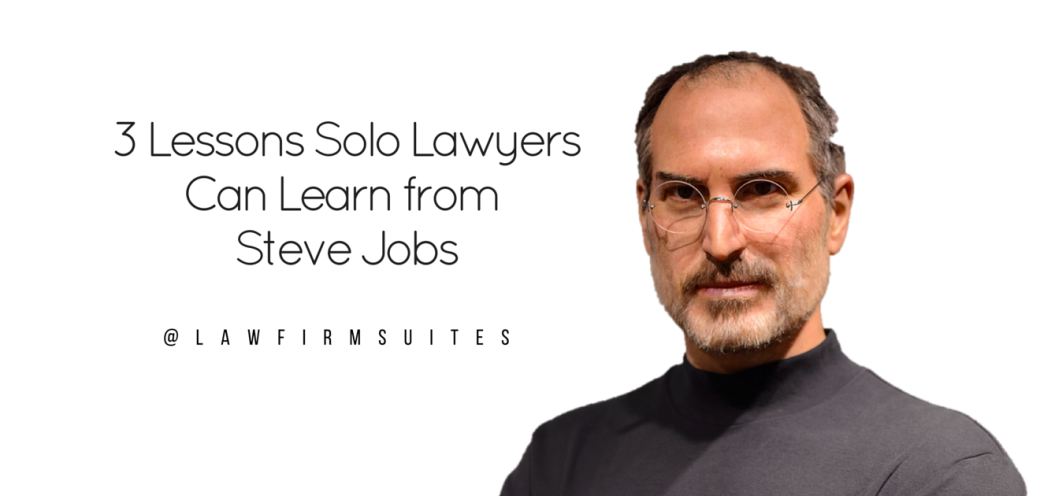An unlikely insider gives his insight into the business ethos that made Apple founder and visionary genius Steve Jobs such a huge success (and why solos can benefit from it).
Whenever Apple founder Steve Jobs’ success is discussed, it’s often by C-level business colleagues or technology journalists. The world recently got a rare glimpse into the business mind of Jobs from an unusual and authentic source: his photographer.
Doug Menuez photographed Jobs from 1986 – 1988 during the development and launch of Jobs’ company NeXT, Inc., and got an intimate glimpse into the personal and professional life of the visionary genius from a fly-on-the-wall perspective.
In a recent video interview for Inc., Menuez shared the professional ethos that he witnessed Jobs’ live by and the lessons he learned from watching the business guru.
Whether your ambition is to build the next Apple, or you simply want the best solo law practice you can build, here are three tips from the master:
1. Have a Clear Vision and Don’t Listen to Naysayers
Menuez observed that Steve Jobs always had a clear vision for his companies. According to Menuez, Jobs didn’t make a habit of listening to naysayers and was willing to put it all on the line, even his entire life savings, to support his vision.
According to attorney and law firm risk management expert, Mark Bassingthwaighte, “the most successful firms, with the happiest lawyers, usually have a clear direction.” Regardless of law firm size, without a clearly written vision of where you want your firm to be, lawyers leave their long term success to the whims of fate.
Lesson from Steve Jobs for solo #lawyers: don’t listen to naysayers. Click To TweetBassingthwaighte recommends that attorneys write out the vision for their practice. It should set out the firm’s goals for the next 5, 10 and 20 years, and how the firm will get there. Bassingthwaighte recommends lawyers focus on:
- How many hours a month they see themselves working.
- What practice areas they wish to focus on.
- Where they hope to be financially.
- Whether they are interested in firm leadership, and if so, in what role.
- When they want to retire.
Solo lawyers have the unique opportunity to follow a career path that can be outside that of the traditional law firm model. Your peers, who may be stuck in that traditional business model, may snicker at you behind closed doors. As many of you know, sometimes even the decision to practice law as a solo attorney is mocked by other practitioners.
Ignore the naysayers. If you follow your vision, the cash will follow you to the bank.
2. Move Through Your Fear
Whether it’s in technology or law, if you choose the entrepreneurial life, fear is something you must learn to manage. According to Menuez, “you’ll never hit it out of the park unless you let go of fear.” Menuez recounts the time when Jobs simultaneously launched neXT and bought Pixar, using $100 million of his own money, nearly his whole life savings.
In 1997, neXT was sold to Apple for $429 million and 1.5 million shares of Apple stock. In 2006, Disney purchased Pixar for $7.4 billion, netting Jobs approximately $4.3 billion.
For solos, the most difficult emotion to deal with is fear. Fear of the unknown. Fear of what might happen or what might not. In essence, the fear of failure.
Solos risk a lot by going out on our own: money, reputation and sometimes even personal relationships.
For solo matrimonial attorney, Joleena Louis, uncertainty was her biggest fear.
Steve Jobs gambled $100 mil of his life savings for his vision, what are you willing to do? Click To TweetAccording to Louis, the fear of paying the bills, getting clients, keeping them happy and the self-doubt around whether or not she could succeed, was paralyzing. At one point Louis considered closing her solo practice to to go back to work as an associate for for a firm.
Like Steve Jobs, Louis learned to work through her fears.
A simple piece of advice from a family member really helped. “My sister asked me if I was honestly doing everything possible to grow my business,” says Louis, “my answer was ‘no.’”
Louis’ sister told her that if she worked harder than anyone else, if she did everything she could possibly do to succeed, it would be impossible to fail.
Louis heeded the advice. She is now in the third year of a rapidly growing practice and has become one of the most innovative legal marketers in New York.
3. Never Give Up
According to Menuez, the single biggest key to Steve Jobs’ success was that he would never give up. Menuez photographed Jobs through the launch of neXT, which was fraught with failure. “Watching him go through hell with that, they were trying to put too many technologies together in one box,” says Menuez, “but he kept going, he just kept going.”
Jobs was willing to go off a cliff for his vision.
If you make a career out of the practice of law, it will be more like a marathon than a sprint. Over the years you will lose jobs, clients, employees, partners, trials and deals. You will make mistakes that will keep you awake at night or may even get you sued. You’ll have good years, and some really bad ones. Things will go wrong in your personal life.
As tough as things may get, you can’t ever give up. There’s always a way out if you seek it, and a valuable lesson to be learned on the other side.


